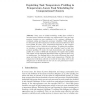Free Online Productivity Tools
i2Speak
i2Symbol
i2OCR
iTex2Img
iWeb2Print
iWeb2Shot
i2Type
iPdf2Split
iPdf2Merge
i2Bopomofo
i2Arabic
i2Style
i2Image
i2PDF
iLatex2Rtf
Sci2ools
144
Voted
APCSAC
2007
IEEE
2007
IEEE
Exploiting Task Temperature Profiling in Temperature-Aware Task Scheduling for Computational Clusters
Many years of CMOS technology scaling have resulted in increased power densities and higher core temperatures. Power and temperature concerns are now considered to be a primary challenge for continued scaling and long-term processor reliability. While solutions for low-power and low-temperature circuits and microarchitectures have been studied for many years, temperature-awareness at the computational cluster level is a relatively new problem. To address this problem, we introduce a temperature-aware task scheduler based on task temperature profiling. We study the task characteristics and temperature profiles for a subset of SPEC'2K benchmarks. We exploit these profiles and suggest several scheduling algorithms aimed at achieving lower cluster temperature. Our findings show a clear trade-off between the overall queue servicing time and the cluster peak temperature. Whether the temperature reductions achieved are worth the extra delay is left to the designer/user to decide based on...
APCSAC 2007 | Cluster Peak Temperature | Computer Architecture | Lower Cluster Temperature | Task Temperature Profiling |
Related Content
| Added | 12 Aug 2010 |
| Updated | 12 Aug 2010 |
| Type | Conference |
| Year | 2007 |
| Where | APCSAC |
| Authors | Daniel C. Vanderster, Amirali Baniasadi, Nikitas J. Dimopoulos |
Comments (0)

